Search Results
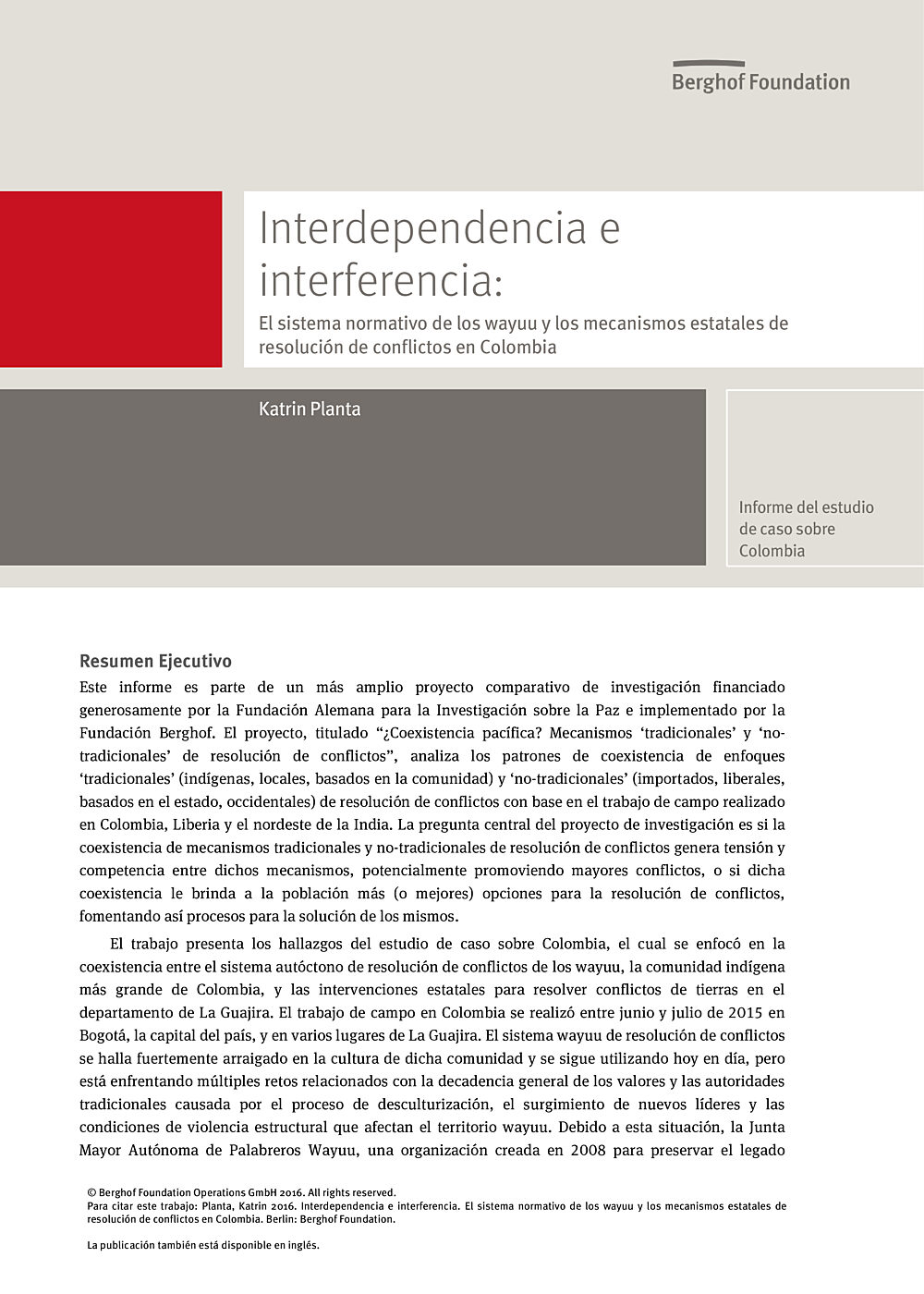
Interdependencia e interferenciaEl sistema normativo de los wayuu y los mecanismos estatales de resolución de conflictos en Colombia (Estudio de caso)
Este informe es parte de un más amplio proyecto comparativo de investigación financiado generosamente por la Fundación Alemana para la Investigación sobre la Paz e implementado por la Fundación Berghof. El proyecto, titulado “¿Coexistencia pacífica? Mecanismos ‘tradicionales’ y ‘no-tradicionales’ de resolución de conflictos”, analiza los patrones de coexistencia de enfoques ‘tradicionales’ (indígenas, locales, basados en la comunidad) y ‘no-tradicionales’ (importados, liberales, basados en el estado, occidentales) de resolución de conflictos con base en el trabajo de campo realizado en Colombia, Liberia y el nordeste de la India.
- Year 2016
- Author(s) Katrin Planta
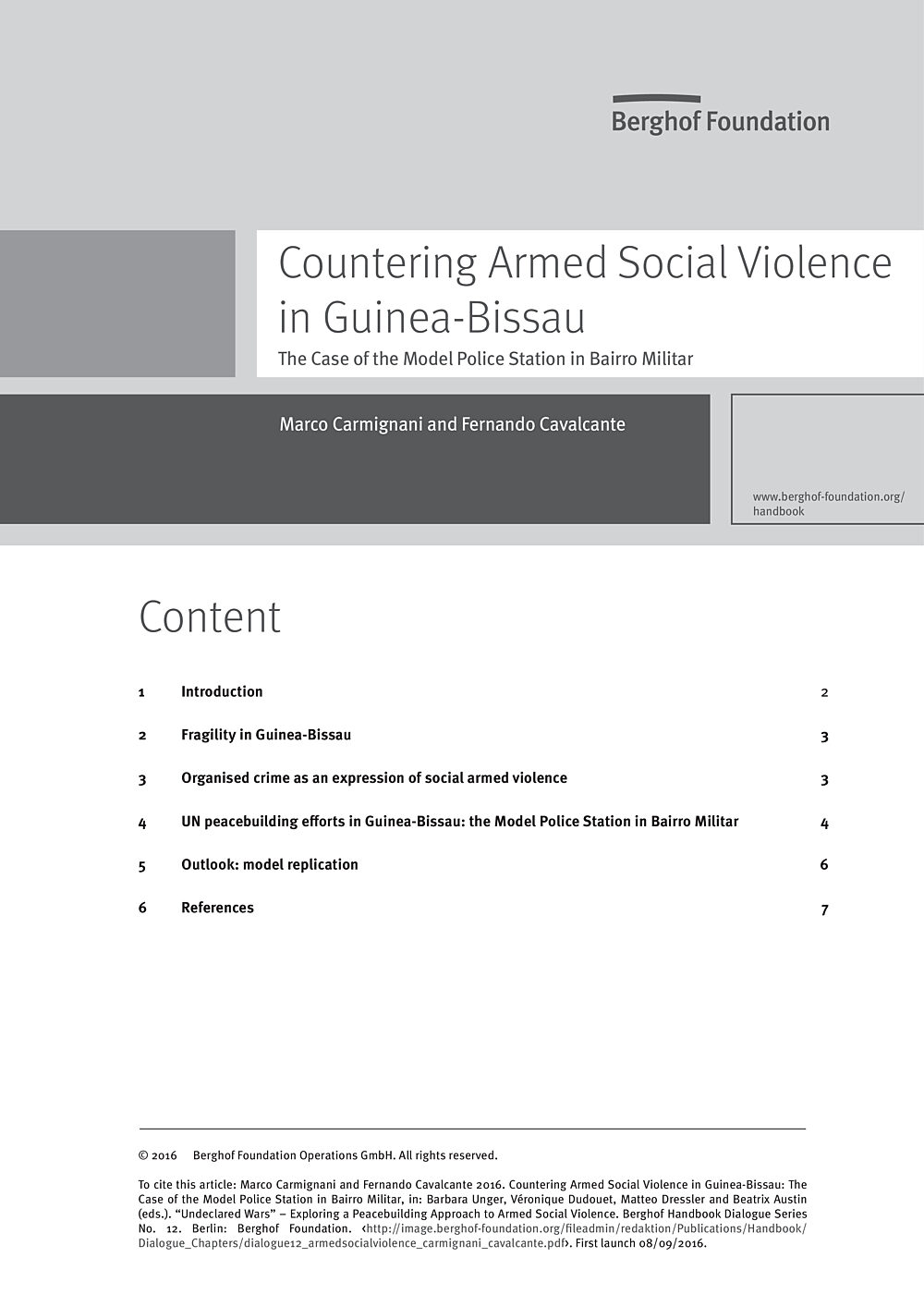
Countering Armed Social Violence in Guinea-Bissau: The Case of the Model Police StationBerghof Handbook Dialogue Series No. 12 - comment
Our response explores the application of these participatory and community-informed approaches in the context of Guinea-Bissau, where a community-based policing model, the Model Police Stations (MPS), had its genesis in participatory research. Participatory research has also informed activities in other areas,such as the prevention of gender violence. In 2011, for example, a comprehensive portrayal of the violence against women in the country resulted from the combination of quantitative data with qualitative research on perceptions (see Roque 2011).
- Year 2016
- Author(s) Marco Carmignani, Fernando Cavalcante
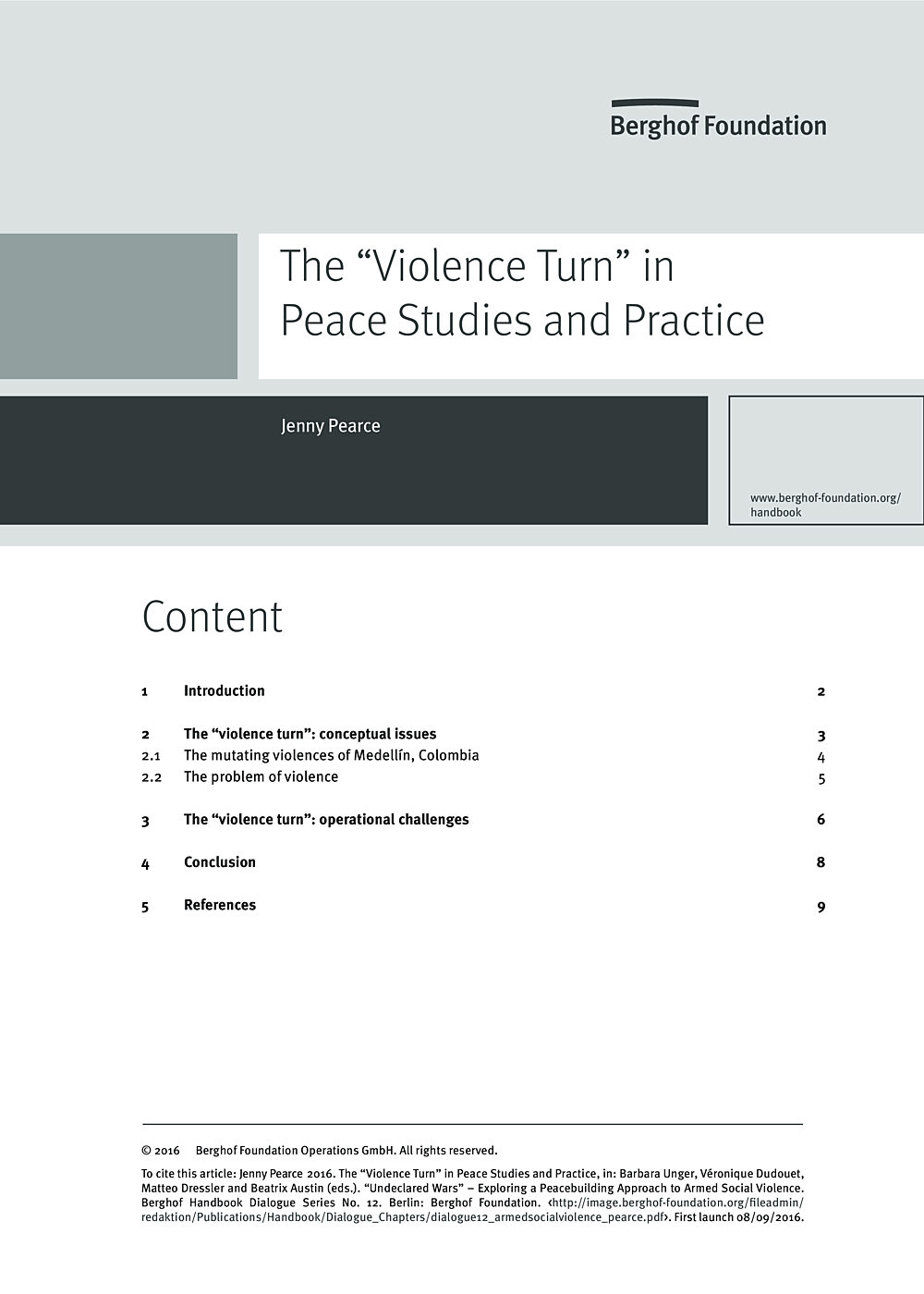
The “Violence Turn” in Peace Studies and PracticeBerghof Handbook Dialogue Series No. 12 - comment
Bernardo Arévalo de León and Ana Glenda Tager have written a succinct and substantive article, which adds to evidence of a shift from the centrality of war and conflict (armed and non-armed) in the study and practice of peace, towards a focus on violence, or rather that aspect of violence the authors call “armed social violence”. Violence, I argue, is the opposite of peace and this step towards recognising the wider expressions of violence is to be greatly welcomed. Violence is extensively studied, but in disciplinary silos. We lack a “converter” to enable us to interpret the learning from these various silos and to help us build new understandings of the varied mechanisms of violence reproduction and reduction. Despite nods to interdisciplinarity, academia reinforces the silos, while practice cannot easily embrace the complexity within and between each.
- Year 2016
- Author(s) Jenny Pearce
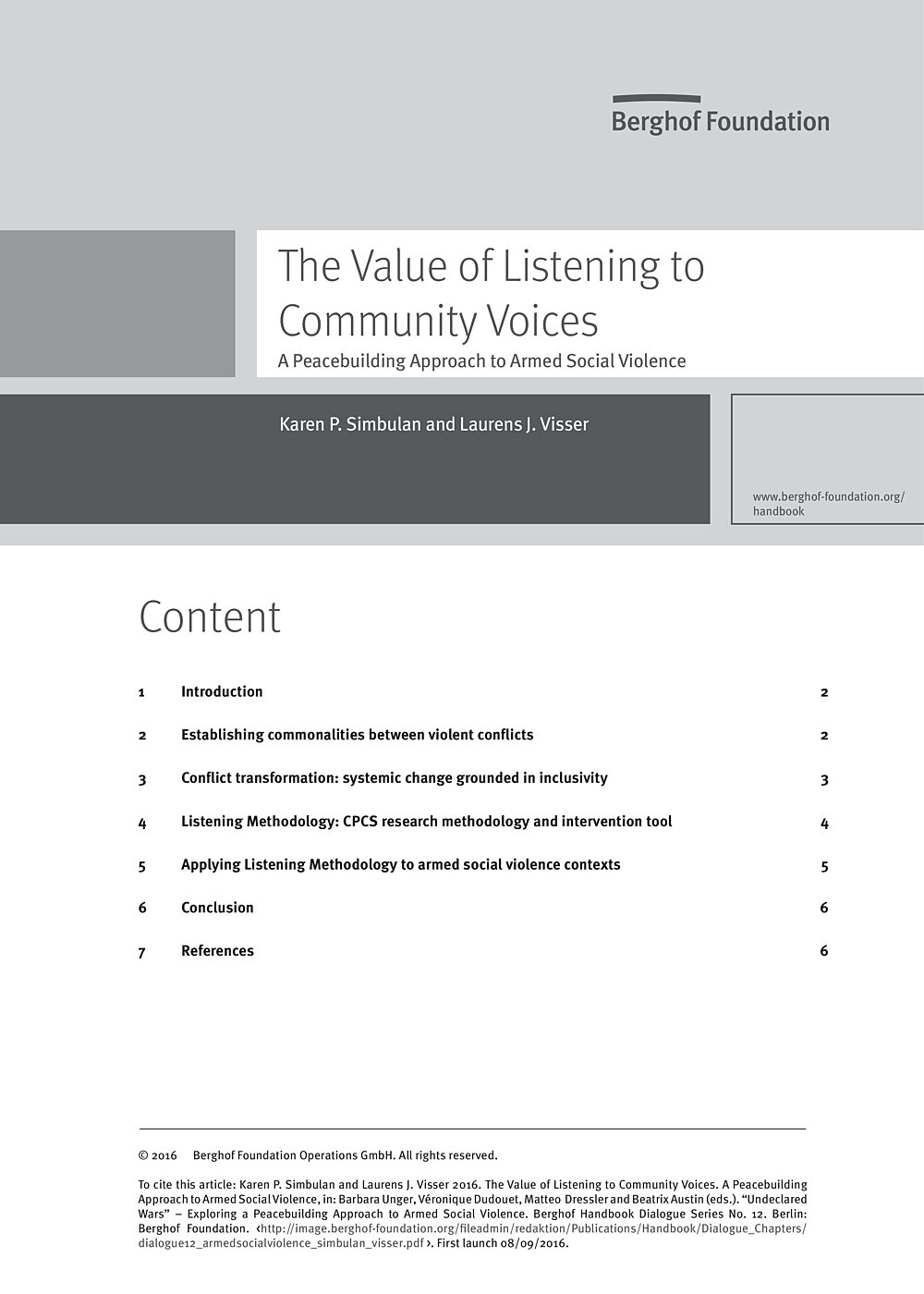
The Value of Listening to Community Voices. A Peacebuilding Approach to Armed Social ViolenceBerghof Handbook Dialogue Series No. 12 - comment
We respond to the lead article from the point of view of conflict transformation practitioners from the Centre for Peace and Conflict Studies (CPCS), a non-governmental organisation based in Siem Reap, Cambodia, which focuses on strengthening and supporting the peace processes in the Philippines and Myanmar and peacebuilding efforts in Sri Lanka. We thus operate within contexts involving state and non-state armed groups engaging or previously engaged in political conflict, and any exposure we have to armed social violence emerges from this context.
- Year 2016
- Author(s) Karen P. Simbulan, Laurens J. Visser
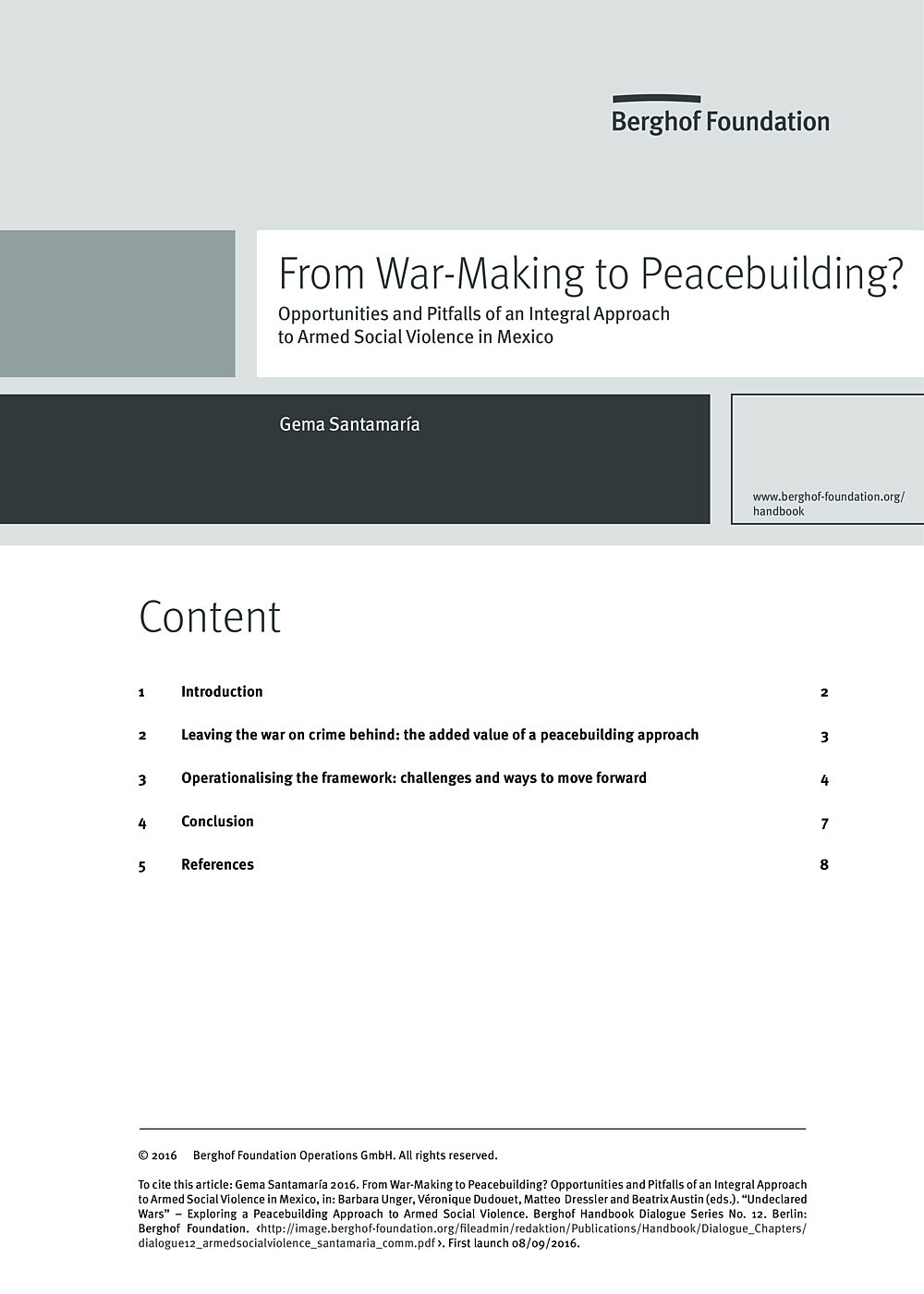
From War-Making to Peacebuilding? Opportunities and Pitfalls of an Integral Approach to Armed Social Violence in MexicoBerghof Handbook Dialogue Series No. 12 - comment
The essay by Bernardo Arévalo de León and Ana Glenda Tager constitutes an important and welcome contribution to a much-needed dialogue on alternative ways to address non-conventional armed violence in Latin America. It offers a critical reference point to move away from the militarised and repressive strategies that have been privileged by most Latin American countries, towards an integral approach that aims to create the necessary conditions to build peace in a feasible and sustainable manner (Arévalo de León/Tager 2016, 20-21). The following response is based on my own research dealing with the sociological and historical underpinnings of armed social violence in Mexico and Central America. It also builds on my experience as a practitioner working within a citizen security framework geared towards the adoption of more integral and sustainable approaches to violence in Latin America.
- Year 2016
- Author(s) Gema Santamaría
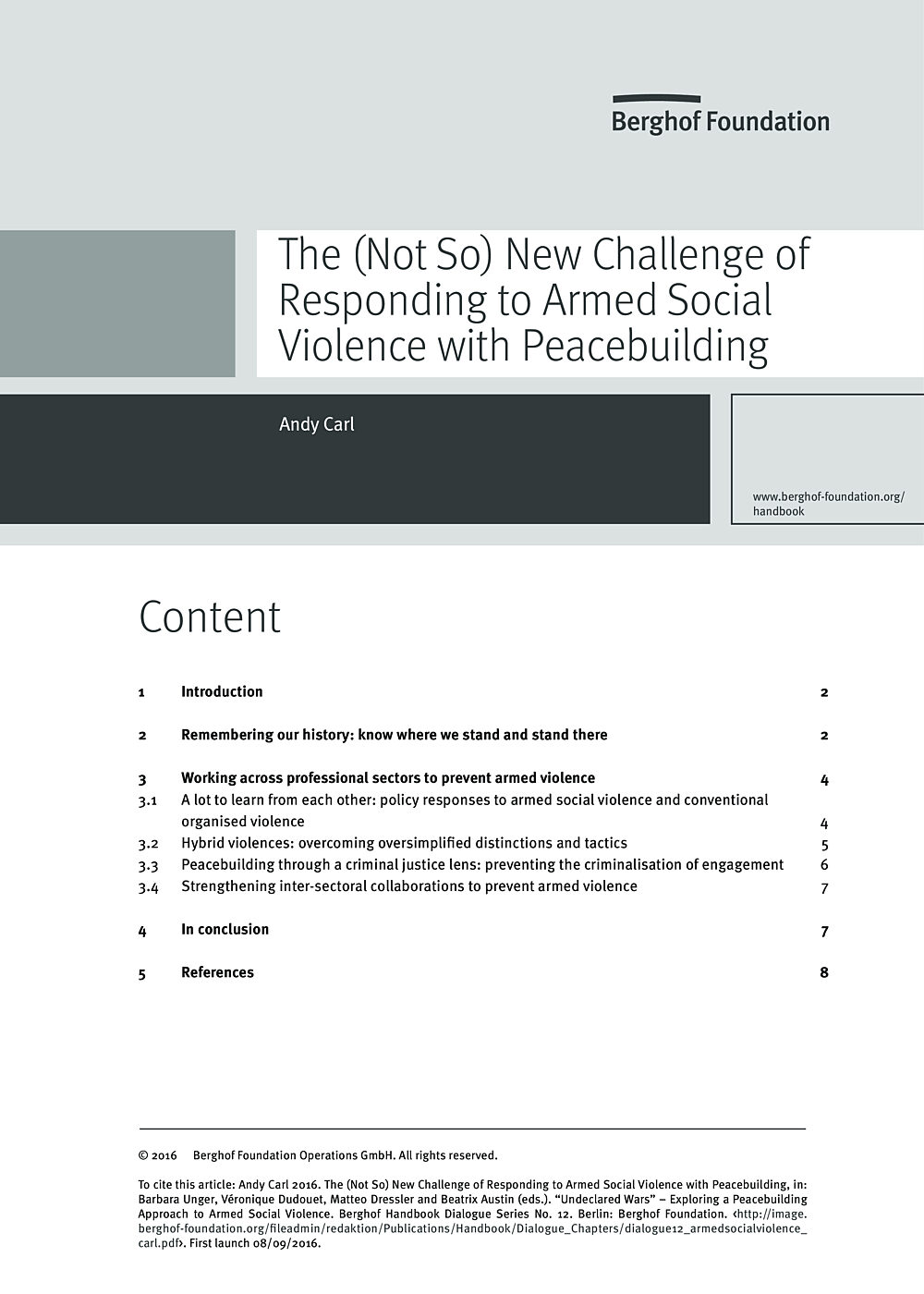
The (Not So) New Challenge of Responding to Armed Social Violence with PeacebuildingBerghof Handbook Dialogue Series No. 12 - comment
Reading the excellent article by Bernardo Arévalo de León and Ana Glenda Tager on armed social violence felt like a long walk in the mountains: challenging, invigorating – and definitely worth the effort. The three strands entwined in their rigorous discourse assert that armed social violence (including criminal and inter-communal violence) is a phenomenon distinct from conventional armed violence and different again from individual and terrorist violence – although they choose not to say much about these latter spheres. The second strand in their argument is that our developing field of peacebuilding has relevant experiences to offer to complement traditional criminal justice responses. Then they move to a call for a different strategic, systemic and operational response, one that fundamentally engages with the complex natures of social and conventional armed conflicts.
- Year 2016
- Author(s) Andy Carl
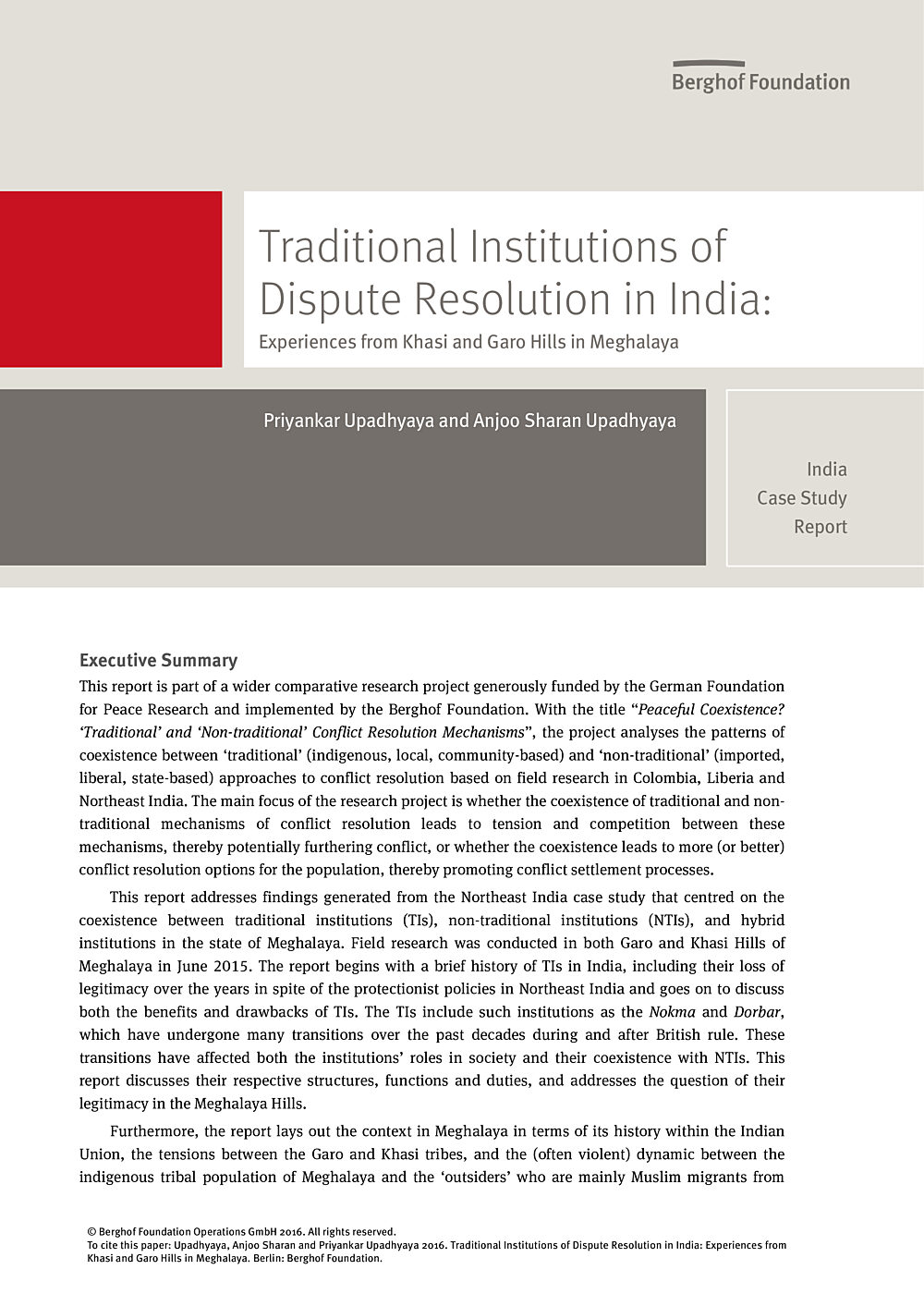
Traditional Institutions of Dispute Resolution in IndiaExperiences from Khasi and Garo Hills in Meghalaya (Case Study)
This report is part of a wider comparative research project generously funded by the German Foundation for Peace Research and implemented by the Berghof Foundation. With the title “Peaceful Coexistence? ‘Traditional’ and ‘Non-traditional’ Conflict Resolution Mechanisms”, the project analyses the patterns of coexistence between ‘traditional’ (indigenous, local, community-based) and ‘non-traditional’ (imported, liberal, state-based) approaches to conflict resolution based on field research in Colombia, Liberia and Northeast India. The main focus of the research project is whether the coexistence of traditional and non-traditional mechanisms of conflict resolution leads to tension and competition between these mechanisms, thereby potentially furthering conflict, or whether the coexistence leads to more (or better) conflict resolution options for the population, thereby promoting conflict settlement processes.
- Year 2016
- Author(s) Priyankar Upadhyaya, Anjoo Sharan Upadhyaya
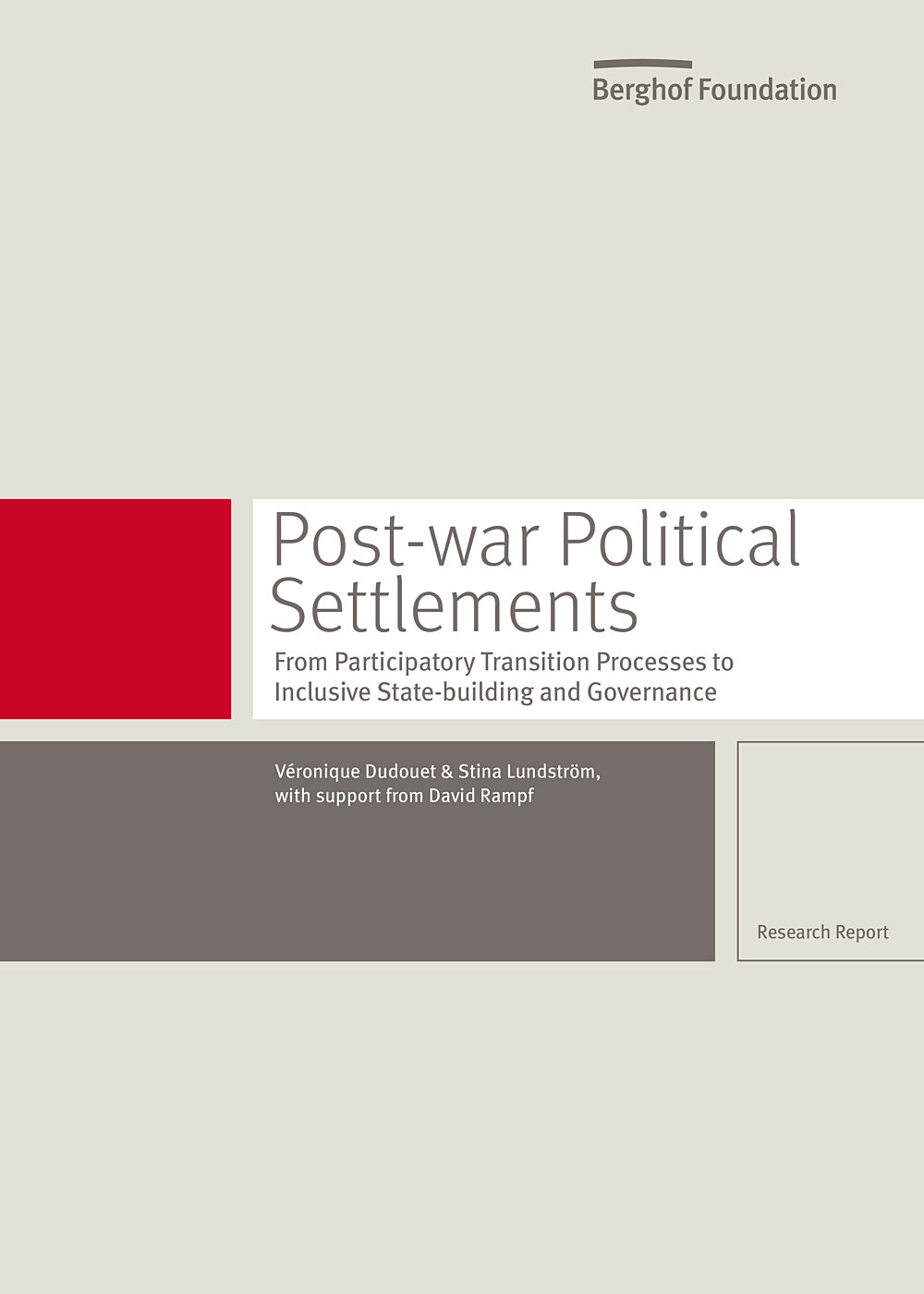
Post-war Political SettlementsFrom Participatory Transition Processes to Inclusive State-building and Governance
The last decade has seen a growing convergence of policy and research discourses among development, peace and conflict, and democratisation experts, with regards to the assumed benefits of inclusive transition processes from conflict and fragility to peace and resilience. The realisation that the social, economic or political exclusion of large segments of society is a key driver of intra-state wars has prompted donor agencies, diplomats and peacebuilding practitioners, as well as the respective academic communities, to search for the right formula to support inclusive and participatory conflict transformation mechanisms and post-war state-society relations. While these various stakeholders profess rhetorical commitment to inclusivity, the term is used in very different and sometimes even in contradictory ways. There are profound disagreements on who should be included in peace processes and political transitions, at what stage and to what end.
- Year 2016
- Author(s) Véronique Dudouet, Stina Lundström
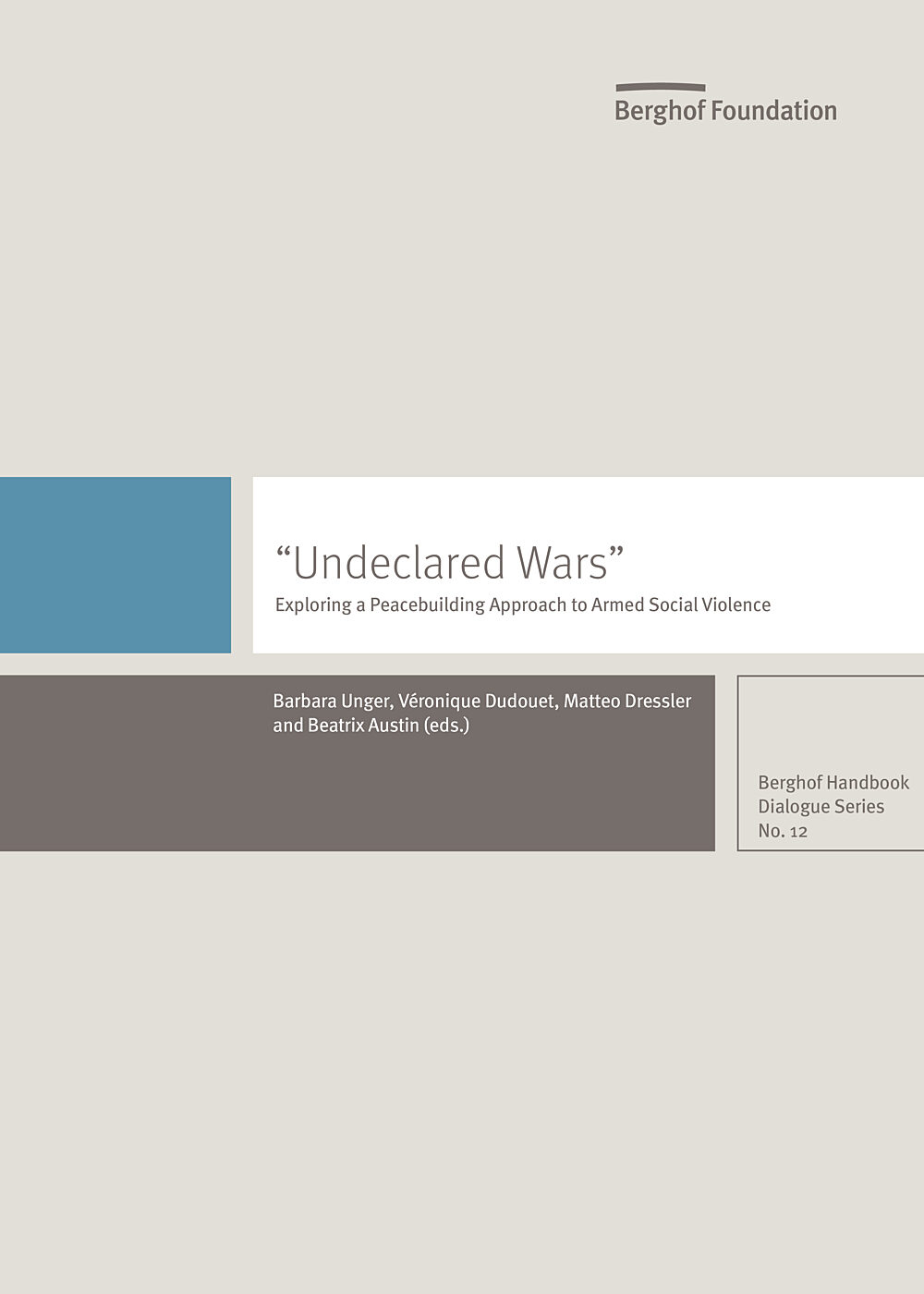
“Undeclared Wars”– Exploring a Peacebuilding Approach to Armed Social ViolenceHandbook Dialogue Series No. 12 - complete
In some countries, more civilians are being killed by armed gangs and criminal organisations than in traditional combat. Still, these pockets of armed social violence – "undeclared wars" marked, among other things, by criminal, gang and/or urban violence as well as extremist violence – have long received much less attention than politically motivated forms of armed conflicts. As their effects — social-political destabilisation, in some cases coinciding with high numbers of victims — are becoming more pressing, national and international actors have begun addressing the phenomenon.
- Year 2016
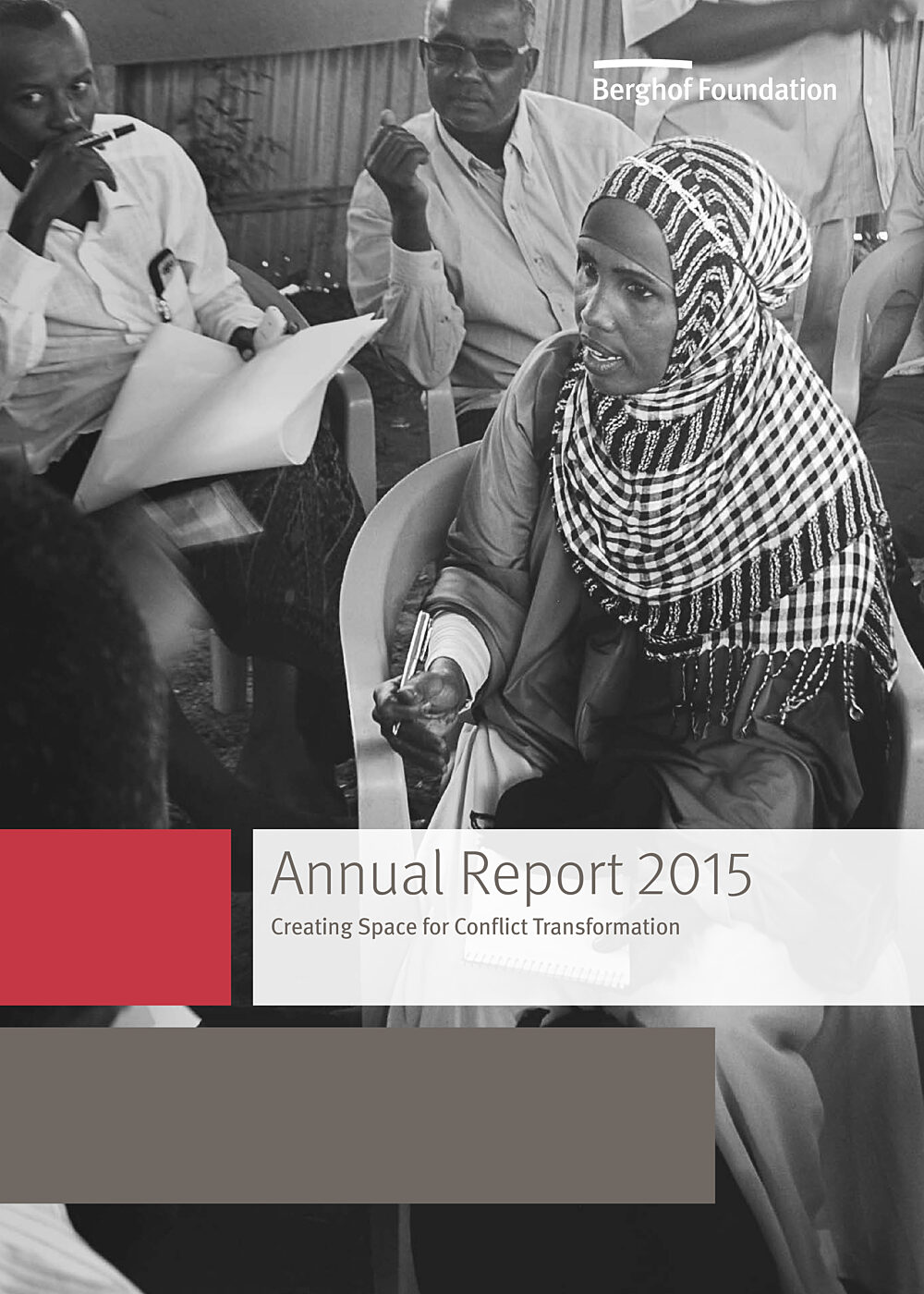
Berghof Foundation Annual Report 2015
Our 2015 annual report lays out some of the activities implemented by our organisation and highlights key achievements of our work over the past year. It illustrates the manifold approaches that we employ as we support our partners in their efforts to transform violent conflicts and engage in cooperation towards peace.
- Year 2016